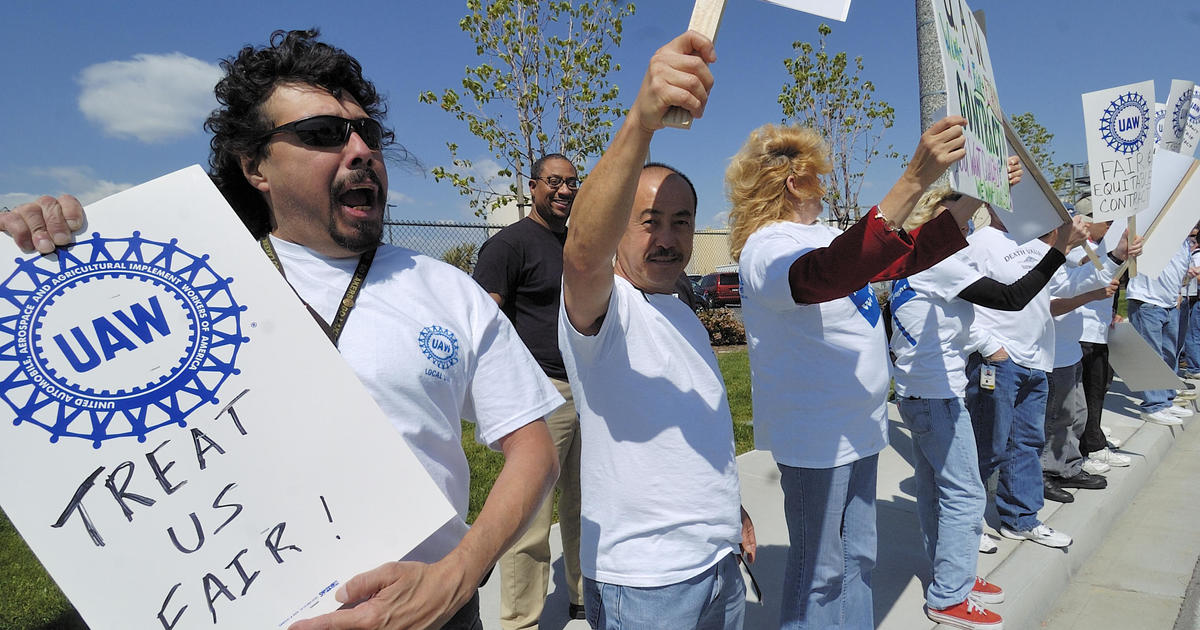United Auto Workers members have overwhelmingly authorized a strike against General Motors, Ford Motor, and Stellantis during ongoing contract negotiations, with an average of 97% of members supporting the action, although the final votes are still being counted.
The United Auto Workers union representing workers at the Big 3 U.S. automakers is demanding a four-day workweek at full-time pay, a 46% wage increase, and a share of company profits, threatening to strike if an agreement is not reached by September 14.
General Motors has made a contract proposal to its hourly workers, offering a 10% increase in wages, among other things, but the offer falls short of the demands of the United Auto Workers (UAW) union, potentially setting the stage for a strike.
Approximately 146,000 U.S. auto workers are poised to go on strike if General Motors, Ford, and Stellantis fail to meet their demands for substantial pay raises and restored benefits, potentially causing significant disruptions in auto production and impacting the U.S. economy.
The UAW union has launched strikes at Ford, General Motors, and Stellantis plants after failing to reach a new labor agreement, resulting in temporary layoffs and potential impacts on the economy.
The United Auto Workers strike against the Big Three automakers continues as negotiations over pay and benefits remain far apart, affecting thousands of workers and causing temporary layoffs at nonstriking plants.
The United Auto Workers (UAW) union is rejecting the 21% pay hike offered by Stellantis, the parent company of Chrysler, as autoworkers from Ford, General Motors, and Stellantis went on strike demanding fair wages and improved benefits.
The United Auto Workers union is set to escalate their strike against the Big Three automakers in an effort to combat stagnant wages and other concessions, with UAW President Shawn Fain expected to announce which plants will join the strike next.
The presence of foreign automakers in the southern United States has been driven by the region's union opposition and the financial incentives offered, but a successful United Auto Workers (UAW) strike could lead to pay raises and make the UAW more attractive, causing concern for foreign automakers who have chosen the South as their manufacturing base.
Despite expanding its strike against GM and Stellantis, the United Auto Workers (UAW) union has decided not to expand the number of Ford workers on strike due to progress in negotiations with Ford.
Summary: The United Auto Workers' strike against the Big Three automakers continues, with Ford reaching a deal with Canadian auto workers but no breakthroughs in negotiations with the UAW, as President Joe Biden prepares to visit the picket lines amid concerns over parts and supply shortages.
Negotiators for the United Auto Workers (UAW) and Ford Motor have made progress on pay increases, but significant issues such as pay and union representation at future battery plants remain unresolved, as the ongoing strike against the Detroit Three automakers enters its 20th day.
Approximately 3,900 United Auto Workers members with Mack Trucks will go on strike after rejecting a tentative agreement that fell short of their expectations for wage increases, equal pay, and shorter work weeks, joining the tens of thousands of UAW members who are already on strike with General Motors, Ford Motor, and Stellantis.
The UAW strike against General Motors and Ford Motor Co. has led to layoffs at automotive parts supplier Sodecia Automotive Detroit, as well as at GM's Toledo Propulsion Systems, Lansing Regional Stamping, and Marion Metal Center facilities, and Ford's Livonia Transmission Plant, impacting a total of about 2,300 employees.
The United Auto Workers union expanded its strike to Ford's largest truck and SUV factory in Louisville, affecting 8,700 workers and disrupting the company's global sales, after Ford failed to make progress in contract negotiations, bringing the total number of striking UAW workers at major automakers to roughly 22 percent of the union's workers, leading to severe disruptions in the industry and ripple effects on suppliers and non-striking UAW members.
The United Auto Workers union escalated its strikes against Detroit Three automakers by walking off their jobs at Ford's Kentucky truck plant, affecting the largest and most profitable Ford plant in the world.
The president of the United Auto Workers (UAW) labor union leading the strike against major U.S. automakers earned a high salary of $347,389, placing him in the top 5% of earners in his home state of Indiana.
The United Auto Workers (UAW) president, Shawn Fain, announced that the union is prepared to expand its strike against the Big Three automakers at any time, marking a new phase in their fight for better contracts.
